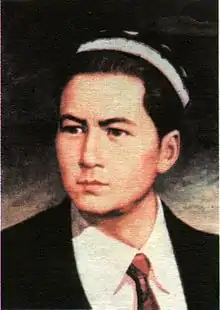Lutpulla Mutellip
Lutpulla Mutellip (November 22, 1922 – September 18, 1945), also known as Li Mutalifu, was a Uyghur poet and journalist. He is considered one of the most important figures in modern Uyghur literature. Although he died young at the age of 22, he had a strong influence on modern Uyghur literature and especially on Uyghur poetry. His poems are reputed for the beauty of his language. "Response to Years" (Yillargha Jawap) is considered to be his poetic masterpiece and "Thoughtful Blessings" (Xiyalchan Tilek) is another one of his most famous works.
Lutpulla Mutellip | |
|---|---|
 | |
| Born | November 22, 1922 |
| Died | September 18, 1945 (aged 22) |
| Nationality | Uyghur |
| Occupation | Revolutionary, poet, journalist |
| Known for | Uyghur literature |
For his work and writing on Uyghur independence, he is remembered by some as a national hero for the Uyghur people.[1]
Biography
He went to a Tatar school in Yining.[2]
Lutpulla moved to Ürümqi after graduating from school[3] in 1939. He attended college at Ürümqi.
He worked a literature page editor for a gazette. He was exiled to Aksu City in 1943 for his poems because they were seen as criticisms of the Chinese government under Sheng Shicai and was eventually put in prison.
Death and burial
Lutpulla was executed in 1945 by Chinese authorities.[3] He was buried in a graveyard in Aksu City. The graveyard was later destroyed and turned into a park called "Happiness Park".[4][5] Chinese officials claim to have moved his remains to a "facility", although the exact location of this facility remains unknown as of July 2020.[6]
Legacy
In August 1956, the People's Committee of the Xinjiang Uygur Autonomous Region ratified him as a revolutionary martyr.
Author Abdulla Talip wrote a book in 1982 called Whirlpool Wave that gave a fictionalized account of Mutellip's life.[1]
Works
- Lutpulla Mutallip Ăsărliri, Beijing: Millătlăr Năshriyati, 1981.
- Izbrannye proizvedeniia, Almaty: "Zhazushy", 1975.
References
- Freeman, Joshua L. 2019. Print and Power in the Communist Borderlands: The Rise of Uyghur National Culture. Doctoral dissertation, Harvard University, Graduate School of Arts & Sciences.
- "Lutpulla Mutellip (1922 – 1945)". Uyghur Academy. Retrieved 27 July 2020.
- Harn, Jessica Aya (26 October 2019). "Lutpulla Mutellip: The legendary Uyghur revolutionary and poet". The Muslim Vibe. Retrieved 27 July 2020.
- "2019 Report on International Religious Freedom: China - Xinjiang". United States Department of State. Retrieved 27 July 2020.
- AFP, CNES / Airbus DS / Earthrise / (9 October 2019). "Then and now: China's destruction of Uighur burial grounds". The Guardian. Retrieved 27 July 2020.
- Harn, Jessica Aya (11 October 2019). "China destroying Uyghur burial grounds in latest move of cultural genocide - TMV". The Muslim Vibe. Retrieved 27 July 2020.
Further reading
- Tursun Arshidin, L. Mutăllip hăqqidă hikayă, Ürümchi: Shinjiang khălq năshriyati, 1982.
- Tursun Arshidin, Lutpulla Mutăllip vă uning kăchürmishliri, Ürümchi: Shinjiang khălq năshriyati, 1998.
- Talip Abdullah, Qaynam örkishi: biogirapik roman, Ürümchi: Shinjang yashlar năshriyati, 1982.
